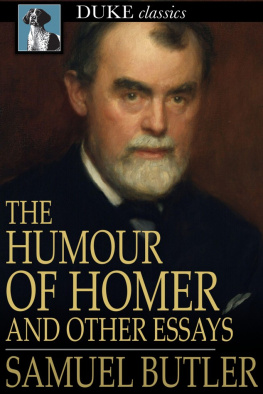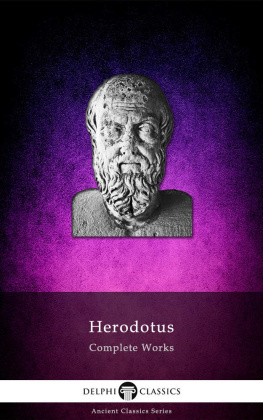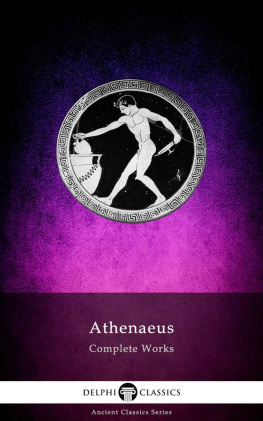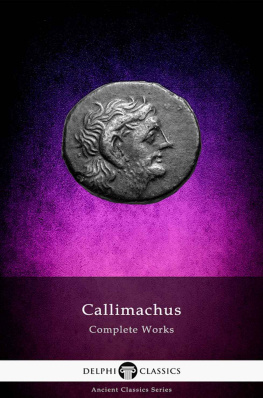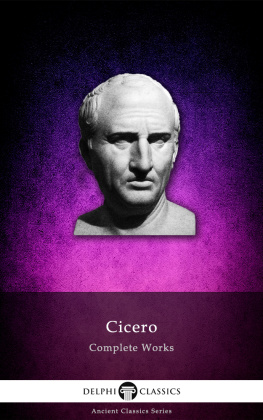
THE COMPLETE WORKS OF
HOMER

Contents

Delphi Classics 2012
Version 2

The Complete Works of
HOMER
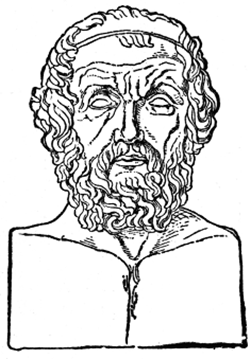
By Delphi Classics, 2012
TheTranslations

The Agora of Smyrna, modern day Turkey where many historiansagree Homer originated from
THE ILIAD

The Iliad is an epic poem in dactylichexameters, traditionally attributed to Homer. Set in the Trojan War, theten-year siege of the city of Troy (Ilium) by an alliance of Greek states, it tells of thebattles and events during the weeks of a quarrel between King Agamemnon and thewarrior Achilles. Although the story covers only a few weeks in the final yearof the war, the Iliad mentions or alludes to many of the Greek legends aboutthe siege. Along with the Odyssey, also attributed to Homer, the Iliad is amongthe oldest extant works of Western literature, and its written version isusually dated to around the eighth century BC. The epic poem contains over 15,000 lines and is often considered to bethe beginning of fine literature.

Achilles tending the woundedPatroclus
CAST OF CHARACTERS
To aid reading The Iliad, a list of the principle characters is providedhere. It may be useful to create abookmark of this page if it is your first time reading this complex work.
Achaeans (also called Greeks, Danaans and Argives)
Agamemnon King of Mycenae and Overlord of the Greeks.
Achilles Leader of the Myrmidons,half-divine war hero.
Odysseus King of Ithaca, thewiliest Greek commander and hero of the Odyssey.
Aias (Ajax the Greater) son ofTelamon, with Diomedes, he is second to Achilles in martial prowess.
Menelaus King of Sparta, husbandof Helen and brother of Agamemnon.
Diomedes son of Tydeus, King ofArgos.
Aias (Ajax the Lesser) son ofOileus, often partner of Ajax the Greater.
Patroclus - Achilles closestcompanion.
Nestor - King of Pylos.
Trojans
Hector son of King Priam and theforemost Trojan warrior.
Aeneas son of Anchises andAphrodite.
Deiphobus brother of Hector andParis.
Paris Helens lover-abductor.
Priam the aged King of Troy.
Polydamas a prudent commanderwhose advice is ignored; he is Hectors foil.
Agenor a Trojan warrior whoattempts to fight Achilles (Book XXI).
Sarpedon, son of Zeus killed byPatroclus. Was friend of Glaucus & co-leader of the Lycians (fought for theTrojans).
Glaucus, son of Hippolochus friendof Sarpedon and co-leader of the Lycians (fought for the Trojans).
Euphorbus first Trojan warrior towound Patroclus.
Dolon() a spy upon the Greek camp (Book X).
Antenor King Priams advisor, whoargues for returning Helen to end the war. Paris refuses.
Polydorus son of Priam andLaothoe.
Pandarus famous archer and son ofLycaon.
The Trojan women
Hecuba () Priams wife, mother of Hector, Cassandra, Paris, and others.
Helen() Menelauss wife; espoused first to Paris,then to Deiphobus; her abduction by Paris precipitated the war.
Andromache() Hectors wife,mother of Astyanax ().
Cassandra() Priams daughter;courted by Apollo, who bestows the gift of prophecy to her; upon her rejection,he curses her, and her warnings of Trojan doom go unheeded.
Briseis a Trojan woman captured bythe Greeks; she was Achilles' prize of the Trojan war.

The Wrath of Achilles (1819), by Michel Drolling
THE ILIAD Chapmans Translation

George Chapman published histranslation in instalments in 1598. Theepic poem is composed in fourteeners, a long-line ballad metre that has roomfor all of Homers figures of speech and plenty of new ones, as well asexplanations in parentheses. At its best, as in Achilles rejection of theembassy in Iliad Nine; it has great rhetorical power. It quickly establisheditself as a classic in English poetry. In the preface to his own translation,Pope praises the daring fiery spirit of Chapmans rendering, which issomething like what one might imagine Homer, himself, would have writ beforehe arrived at years of discretion. John Keats praised Chapman in the sonnet On First Looking into Chapman's Homer,which is provided below:
On FirstLooking into Chapman's Homer
Much have I travell'd in the realms of gold,
And many goodly states and kingdoms seen;
Round many western islands have I been
Which bards in fealty to Apollo hold.
Oft of one wide expanse had I been told
That deep-browed Homer ruled as his demesne;
Yet did I never breathe its pure serene
Till I heard Chapman speak out loud and bold:
Then felt I like some watcher of the skies
When a new planet swims into his ken;
Or like stout Cortez when with eagle eyes
He star'd at the Pacific and all his men
Look'd at each other with a wild surmise
Silent, upon a peak in Darien.
by John Keats

Chapman, an engraved portrait from his Works
CHAPMANS ILIAD
CONTENTS

INTRODUCTION.
THE flight of cranes, murmur of beesthat from their hollows in the rocks seek the spring flowers, swarming of fliesto the spring milk, the west wind waving the grain, and the east and southraising the waves of the Icarian Sea; man, conscious of beauty in the worldaround, labouring upon the soil, tending his herds, labouring at the loom, theforge, the potter's wheel, and by the work of his hands adding new beauty; man,worshipping on hills and heaths the powers of Nature; sacrificing to the powerof the air by lifting the bead of the ox, and causing the blood of sacrifice tospirt towards the sky, sacrificing to the power of the sea by slaying thevictim where its blood reddens the wave, and to the power of the under-world bymaking the blood pour from the lowered neck into a hollow of the ground; eachwarrior-chief his people's priest, earth,- sea, and air, temple and Gods inone; the wealth and the worship of Nature, were in Homer's world. It was stillnight over Europe. Our earliest rays of intellectual light were yet to spreadalong the shores of the Mediterranean from that dawn in the east which firstshone upon Greece.


